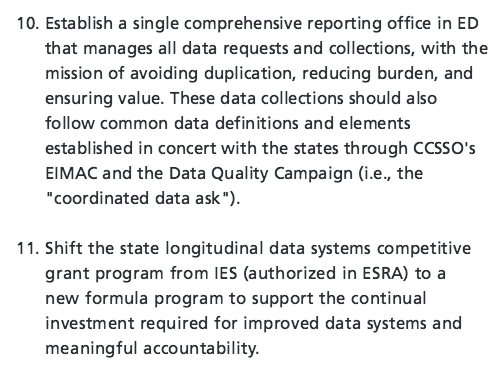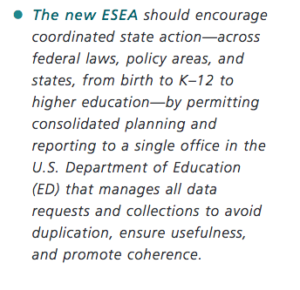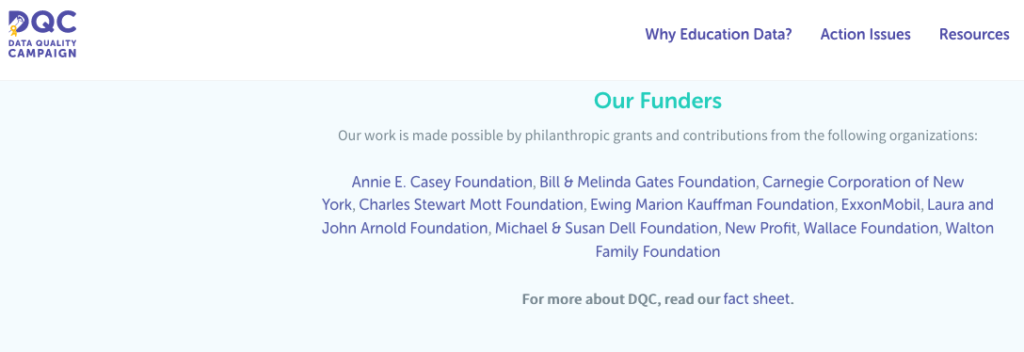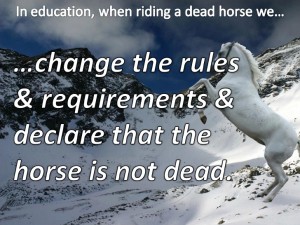No Child Left Behind (NCLB) was a failed experiment. That is, it failed as a reform for schools.
So why do Americans continue to trust many of the very same people who created the law to now lead us down yet another path – over a decade later? This time, the National Governors Association (NGA) and Council of Chief State School Officers (CCSSO) (ESEA_Task_Force_Policy_Statement_2010) plan to use the rewriting of NCLB to consolidate data reporting to a single “office in the U.S. Department of Education that manages all data requests and collections…” (with good intentions?). (Update 12/10/15: NCLB changed to The Every Student Succeeds Act – ESSA. The lead groups on Common Core — the non-governmental trade organizations CCSSO and NGA —have more power under ESSA than they did under NCLB.)
(Update 12/10/15: NCLB changed to The Every Student Succeeds Act – ESSA. The lead groups on Common Core — the non-governmental trade organizations CCSSO and NGA —have more power under ESSA than they did under NCLB.)
This country desperately needs to talk about proper roles of government in education. But for now, local control?
When and how students receive additional help should always be made at the school level. Do we need good data there? Yes. But more importantly, we need capable, caring people who understand kids!
Every state put in a longitudinal data system so that each state could track each student in order to make “better decisions” as to where and how to spend our education dollars — at the state level (?). Fair enough, maybe. That is supposedly why the Data Quality Campaign came into existence. But check out the campaigns supporters at the bottom of this page and ask yourselves, should data systems have been a priority?
“Coinciding with the movement for more and better data, federal lawmakers established the Statewide Longitudinal Data Systems (SLDS) grant program (part of the Educational Technical Assistance Act of 2002) to help states design, develop, and implement longitudinal data systems.” (Source New America Foundation, Many Missing Pieces)
People – this was back in 2002!!! And now, it is time to “consolidate data” to a point of central control. Our lack of vigilance has been astounding!
“…there was a diabolical realism in his plan to make all learning the monopoly of the elite which was to rule his envisioned world empire and keep the anonymous masses barely literate.”
That is what Eric Hoffer wrote in the The True Believer: Thoughts on the Nature of Mass Movements. He was speaking about Hitler. Control of the education system is THAT important!

Stop IT ! P.S. I think Godwin’s Law is detrimental to open discussions about our times and history.
Until the day that the anonymous masses of citizens once again have control over their government, we must defend every inch of control we have remaining over the public education system.
Welcome to the Real Education War!
~~~~~~~~~~
To know more, read about the power and control of the Common Core Standards and the excellent comments from the people.
~~~~~~~~~~
Addition 2/17/16: You can also learn more about the Common Core “Initiative” through this smorgasbord of blogs. I suggest beginning with “Research Made Me Do It.” What it made me do is take a firm stance against corporate takeover of the public education standards, assessments, curriculum, data systems, and the production of a totalitarian workforce development system.
~~~~~~~~~~
Addition 9/7/17: Consider this. ESSA State Consolidation Plans are all approved by the Secretary of Education. After approval, will all states then submit their data as evidence of compliance (“accountability”)? The “new” ESEA is ESSA. It delivered. The question now is, how much will we pay for it?
Two more additions:











